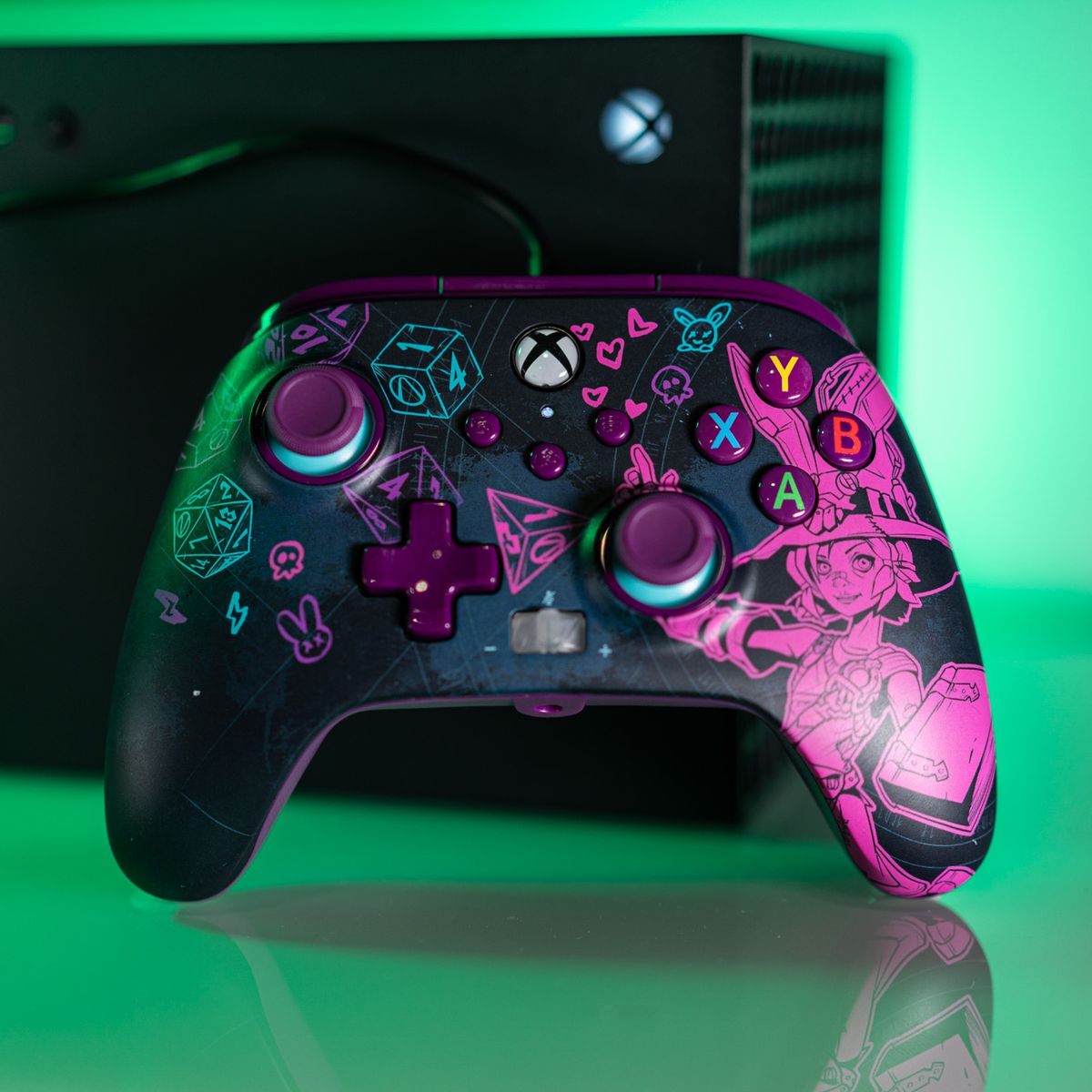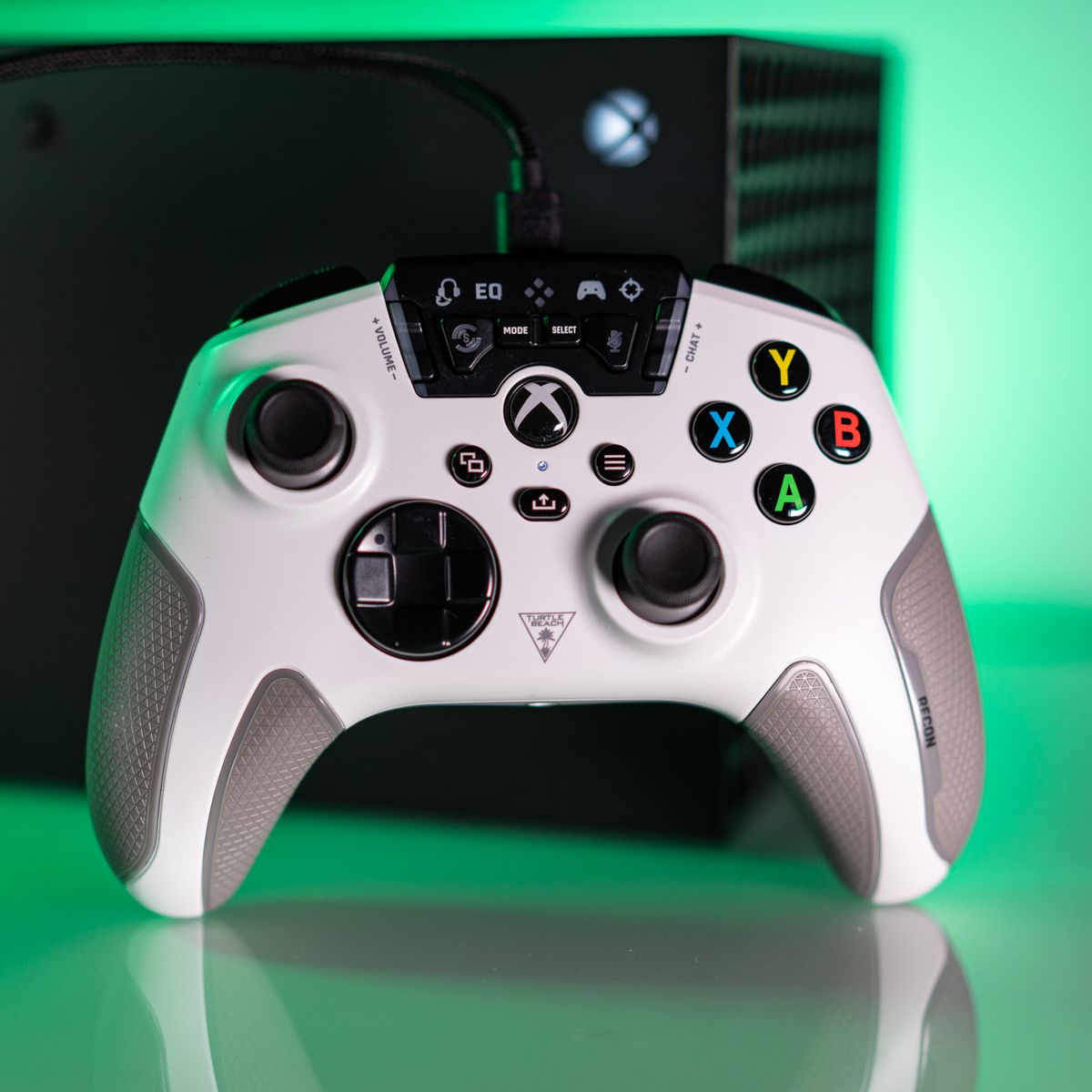You may not realize it, but we’re living in a golden age of gaming controllers. The gamepads on the market now are better quality, more versatile, and more customizable than anything from just a few console generations ago. That includes the plethora of third-party options from the likes of PowerA, Scuf, Nacon, and Turtle Beach, as well as first-party controllers from the console makers. The days of the cheap, “little sibling” controller that looked cool but barely worked are over.
Now, you can choose from a variety of controllers, and if you’re playing across Xbox and Windows PC, the same option works for both. So, let’s say your console of choice is the Xbox Series X or Xbox Series S. What’s the best option for you? Well, we tested a whole slew of controllers to find the best Xbox controller you can buy.
The standard Xbox Wireless Controller came away as our top choice, which may sound obvious, but it’s the best for a reason — versatility, comfort, and much more. Beyond that, we’ll walk you through some strengths and weaknesses of other controllers worthy of your attention, ranging from premium options like the Xbox Elite Series 2 and Scuf Instinct Pro to some quality budget picks like the PowerA Enhanced Wired Controller.
There are, of course, older, discontinued models that are still compatible — as Xbox One controllers are forward compatible with the Xbox Series X / S — but our focus is to guide you through what to buy that’s regularly available right now. We’ve got categories to help steer your purchasing decision and find the right one for you, including customizable options that may give you a tiny edge in competitive multiplayer games. Plus, with Amazon Prime Day coming up on July 12 and 13th, it’s likely many of these controllers may go on sale.

1. Microsoft Xbox Wireless Controller
The best Xbox controller for most people
Okay, I already know what you’re thinking. “The best controller for Xbox is the one that comes with the Xbox?” That may seem like a no-brainer, but I assure you this “standard” controller truly does earn this title as the best option for most Xbox gamers. It may lack some of the extra features that we’ll go over on premium options, but this controller is the distillation of four generations and numerous first-party controllers before it — and it shows.
This is the only affordable wireless option out there, thanks to Microsoft’s proprietary wireless protocol. While some may hate that it comes with AA batteries instead of a built-in rechargeable cell, that also means it’s flexible, allowing for rechargeable AAs or a battery pack. It also works as a wired accessory when paired with a USB-C cable, and user-replaceable batteries mean you’re not stuck with a controller that doesn’t hold its charge after years of use.
But the standard-issue Xbox pad isn’t just great because of its connectivity. The hardware itself is excellent for the controller’s $60 asking price. The sticks, buttons, triggers, and the sunken dish-shaped D-pad all feel impeccably tight, with the latter having a satisfying clickiness to it. If you’re a hardcore fighting game fan, you may be better served by an arcade stick or a controller geared toward that genre — one with an impeccable D-pad like Hori’s Horipad Pro — but the Xbox Wireless Controller is an exceptional jack-of-all-trades.
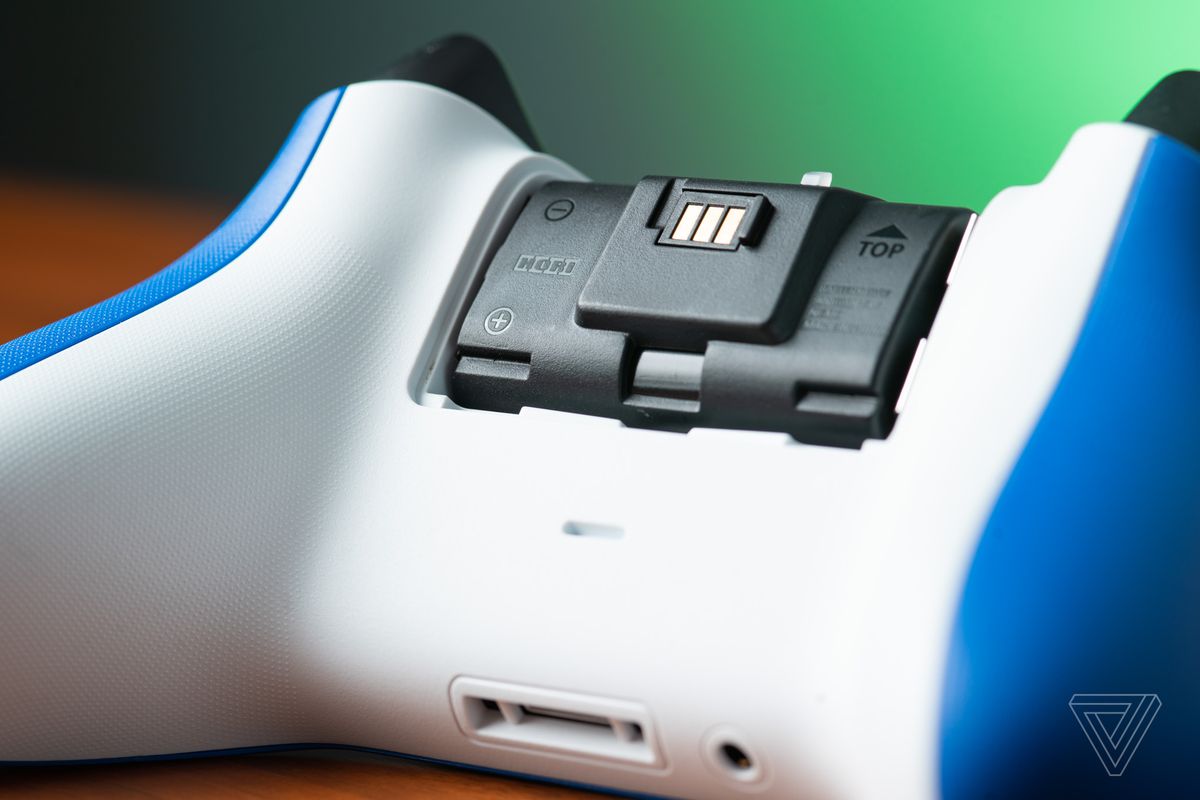

The only thing it really lacks compared to pricier options are extra, customizable buttons and software tuning for things like stick sensitivity, though Microsoft does offer cosmetic customization through its Xbox Design Lab, which ranges from $69.99 to $99.94 depending on the configuration. There’s a lot to love about these controllers, whether you make your own or pick out one from the various colors Microsoft continues to offer.

2. PowerA Enhanced Wired Controller
The best budget controller for Xbox
If you’re looking for a great controller but you don’t have a lot of money to spend — and you don’t mind a cable — PowerA’s Enhanced Wired Controller offers an impeccable value without sacrificing too much. Its full retail price is $37.99, but some colorways can dip as low as around $25. Speaking of colors, the Enhanced Wired Controller comes in a wide variety of hues and designs, including licensed ones from game franchises like Mass Effect and Fallout. Some of these designs may make you suspect these are cheap, cringe-inducing knockoffs, but the quality of the controller may surprise you when you use it.
First off, let’s get its biggest downside out of the way: it uses a Micro USB connection (gross, I know). You at least get a lengthy, detachable cable with it, but not having a reversible connector is annoying. Thankfully, nothing else about this controller feels so outdated. Its build quality is just fine, and it even has two mappable rear buttons built into the grips — which is great to have at such a cheap price point.
The rest of the PowerA Enhanced Wired Controller is a whole lot of table stakes, but it executes everything quite well for a ridiculously affordable price. PowerA omitted impulse trigger rumble, but if there’s any feature to cheap out on, I’d say that’s the right choice. On the flip side, the Enhanced Wired Controller comes with a two-year warranty, which is twice as long as pricey options like Microsoft’s Elite Series 2 offer.
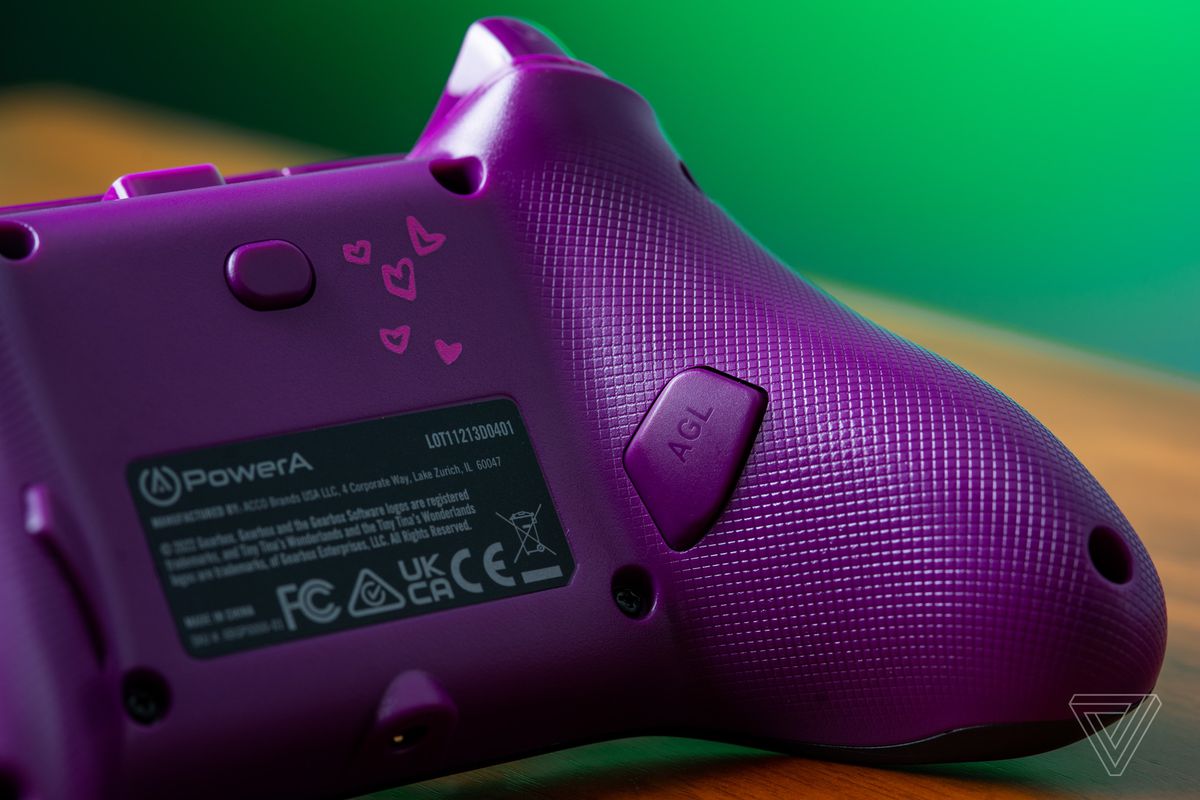
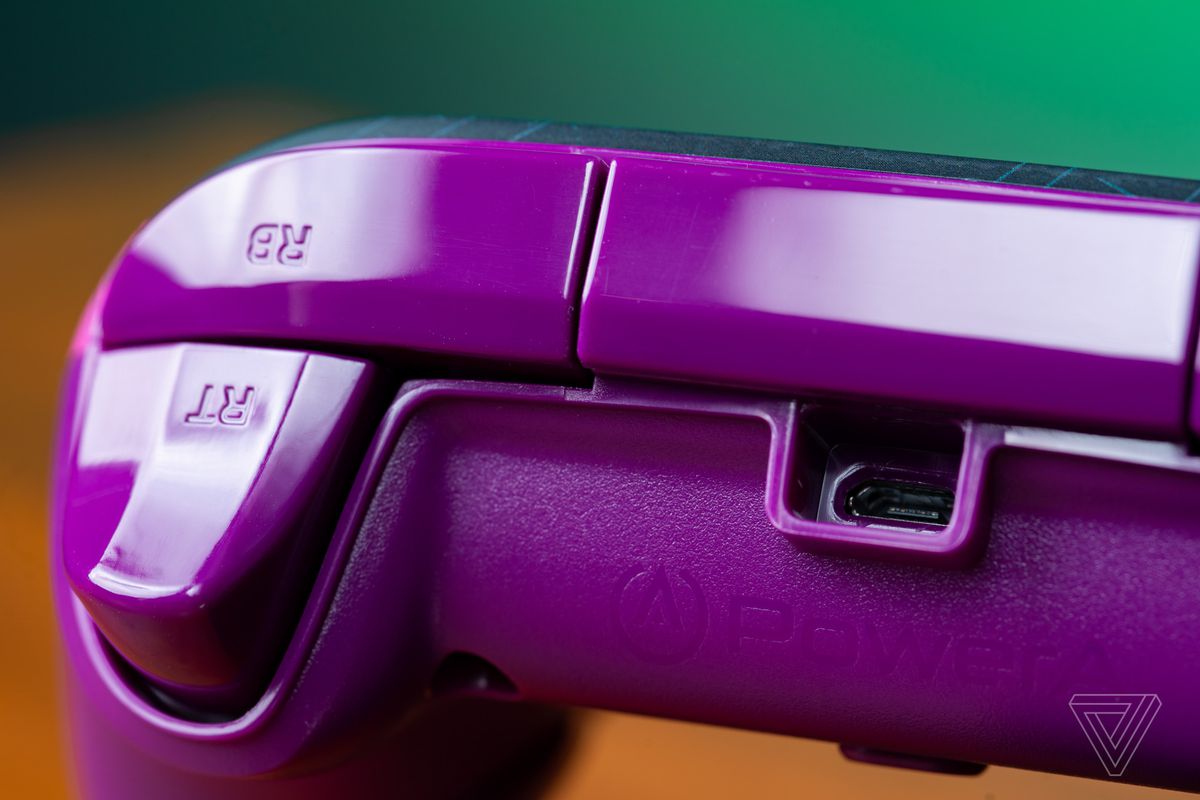
PowerA offers a whole lot of bang-for-your-buck with the Enhanced Wired Controller if you’re on a tight budget. It’s also worth mentioning that if you have a bit more to spend, the PowerA Fusion Pro 2 is another great controller that punches above its weight class. The Fusion Pro 2 looks a bit like an imitator of Microsoft’s Elite Series 2, but its full price of $89.99 usually drops as low as $62.99. This is one to opt for if you’re looking for a premium controller with added features, like four rear paddles and rubberized grips, but you have a budget closer to a standard Xbox controller.
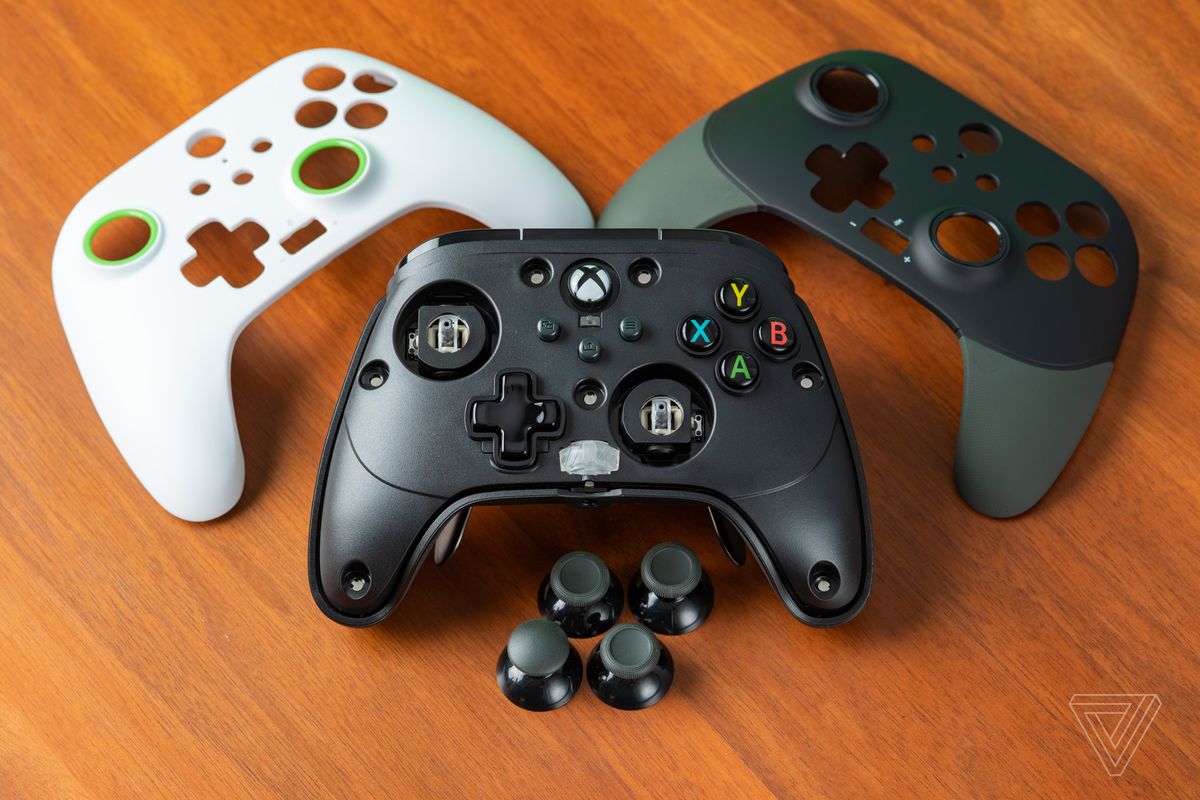

The best premium controller for Xbox
The Xbox Elite Series 2 controller is Microsoft’s fancied-up, premium version of the stock controller. It’s also older, having been released a year before the Xbox Series X / S consoles arrived. So while it does sport a USB-C port and wireless support, it lacks the convenient Share button found on the latest Xbox Wireless Controller. However, it makes up for that in droves with exceptional build quality, extra buttons, user-swappable sticks and D-pad, and lots of customization.
If you pick up an Xbox Elite controller, you instantly recognize the quality of materials put into it. Where the standard controller uses an unassuming plastic build, the Elite mixes higher quality plastic with rubberized grips and bits of metal. Combine this with its built-in rechargeable battery, and the Elite is noticeably heavier than its lower-cost brethren. It also comes packaged with a charging dock and zip-up case with passthrough charging.
As excellent as the fit and finish are, the key components that may give you a competitive edge are the hair-trigger locks and rear paddle buttons. In theory, the hair trigger gets shots off faster when playing shooters, and the rear paddles allow you to jump, crouch, reload, etc., without taking your thumb off the right stick for aiming. However, using that many buttons on the back of the controller definitely takes some adjustment. You have to train new muscle memory, and since it requires dexterity with more fingers, they’re not for everyone.
These premium features come at a steep cost, too. The Elite Series 2 is normally priced at $179.99, and even though it frequently drops to $139.99, it’s still more than twice as expensive as a regular Xbox controller. You have to really want its extra features and user customization, and if you’re not using its rear paddles or the software adjustments for stick sensitivity, you’re not getting your money’s worth.
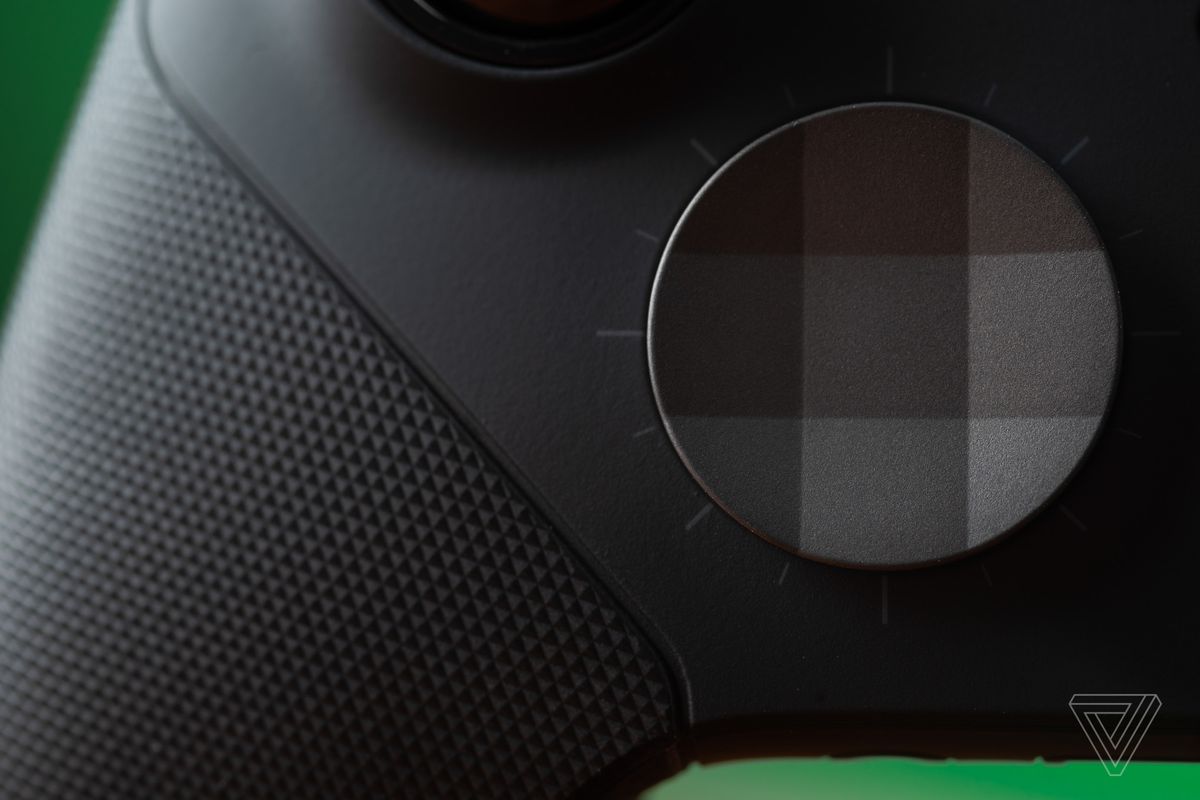

You must also be aware that the Elite has a bit of a reputation for lackluster quality control, with horror stories from users about going through multiple replacements under warranty. Microsoft extended the controller’s warranty from 90-days to a year in late 2020 to help address concerns, but buying an Elite Series 2 may still feel like a slightly risky proposition. However, when you land that perfect sequence — switching to your pistol and landing a headshot with a quick pop-pop of the hair trigger while your thumbs stay firmly planted on the sticks — it can feel worth it.

4. Scuf Instinct Pro
An even pricier runner-up to the Elite
The Scuf Instinct Pro finds itself in a bit of a weird spot, as it’s the only wireless option from a third party, but it’s by far the most expensive Xbox controller around (it starts at $199.99). The one I tested clocked in at $263.91 with a special faceplate and added color accents. That’s more than the Xbox Series S occasionally sells for, which is an entire console. Still, you’re in for a treat if you’re okay with spending that kind of money, as the Instinct Pro is arguably better than Microsoft’s Elite in some very specific ways — primarily, its comfort and implementation of rear buttons and hair triggers.
The Instinct Pro has very unique rear buttons, and I actually prefer them. Instead of paddles, there are four rocker-like buttons built into the controller’s body that you push toward or away from your hand with a middle finger. It still requires training your brain a bit to get accustomed to it, but I found them more intuitive.
Rear buttons aside, the Scuf’s other big feature is its hair triggers, which have the quickest response of all the controllers tested here. Just flick a switch on the back, and the left and right triggers feel like you’re clicking a mouse — it’s incredibly satisfying. The hair triggers, rear buttons, and the excellent textured grip material on the controller’s underside go a long way to make this controller a joy to use.
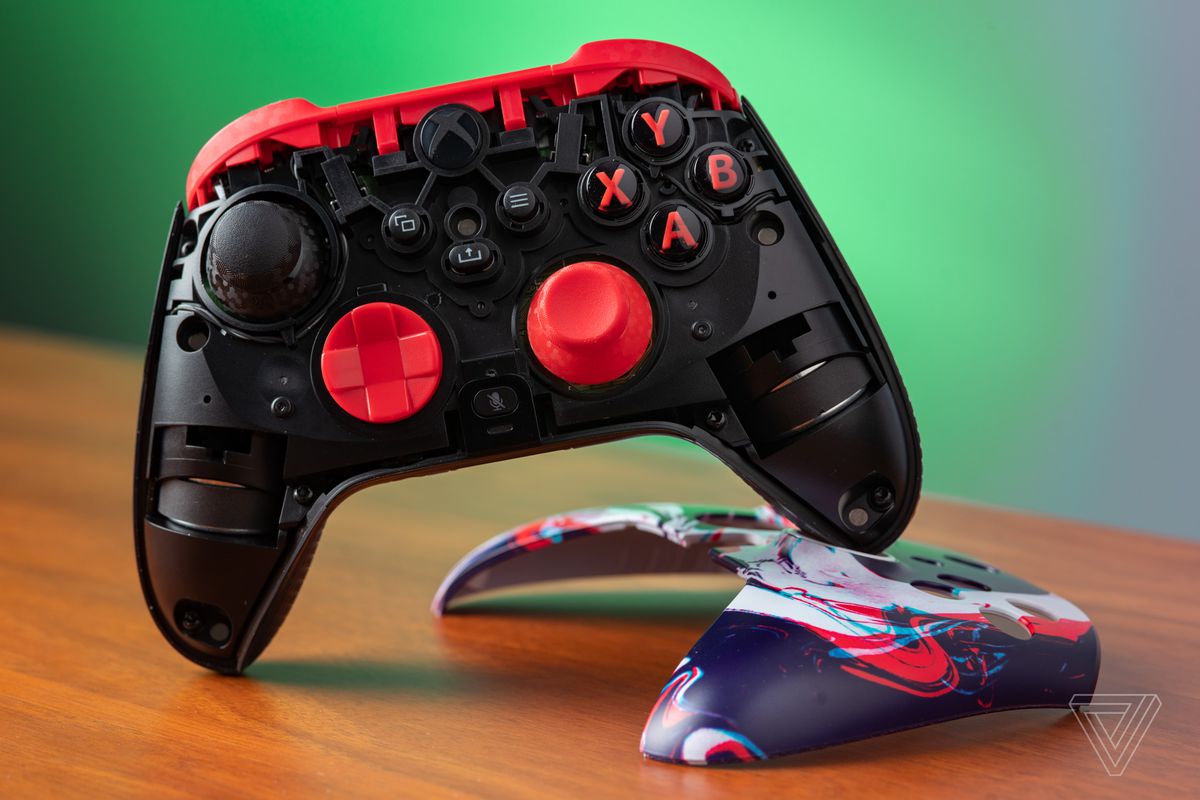

The Instinct Pro feels like Scuf essentially hot-rodded a stock Xbox controller, but like any boutique item, it comes with a massive cost. Meanwhile, it still uses AA batteries and lacks software customization, so as much as I enjoy using it, I’d only advise getting one if you’re super passionate about its very specific qualities or you absolutely love the colorful accents and magnetically swappable faceplates on Scuf’s configurator.
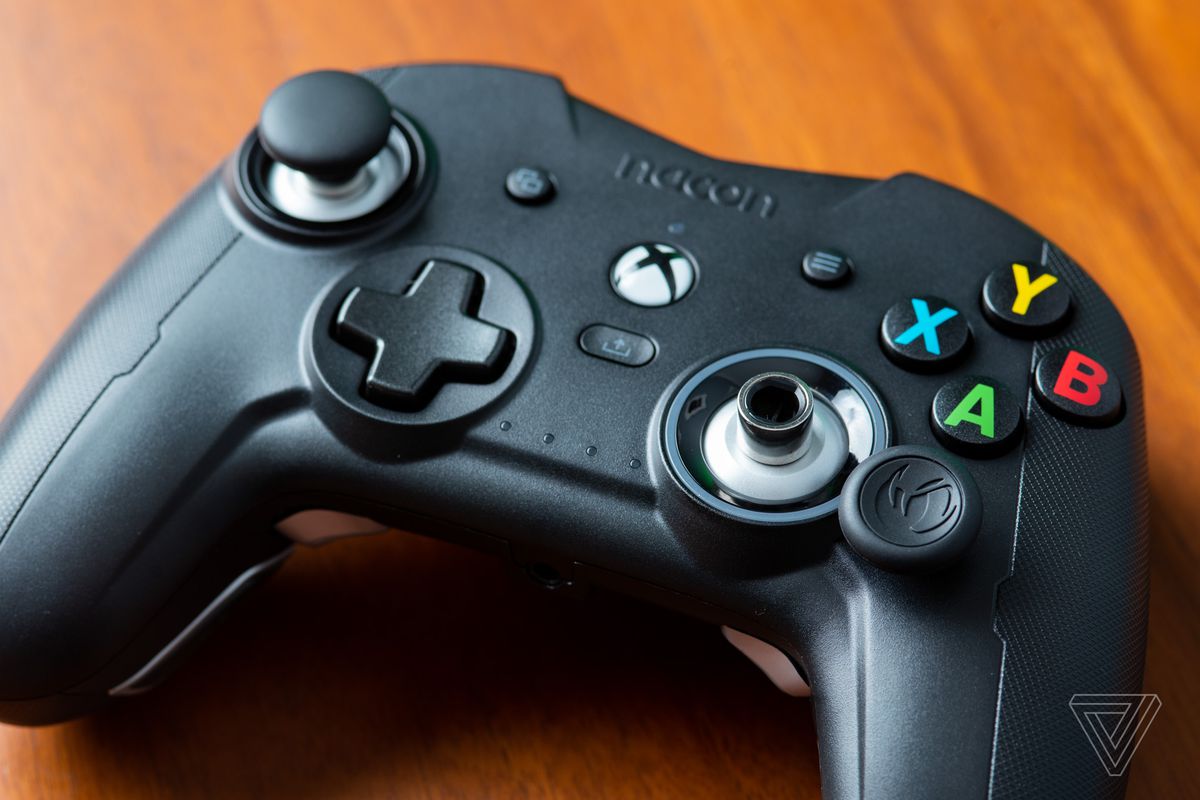
5. Nacon Revolution X
The best customizable controller
RIG’s Nacon Revolution X may be worthy of an award for terrible naming, but its real strengths are in its deep customization. If you’re the type that likes to endlessly tinker with lots of detailed settings, this is the controller for you. Normally priced at $99.99, the wired Revolution X and its added features don’t come cheap, but the price is a little fairer when you consider the competition it squares up against.
When you first pick up the Revolution X, it seems very unassuming — and borderline cheap. While it’s not a looker, it’s a form follows function type of controller. It’s comfy to use, and its four rear buttons built into the grips are large and nicely contoured. The real stars of this show, however, are the analog sticks and their software customizations, as well as the expansive custom options for other inner workings of the controller.
While other user-customizable controllers have three user profiles you can swap between on the fly, the Revolution X has four — plus a “classic” mode with basic settings and a ring of RGB light around the right stick to remind you what mode you’re in. The software app is not the most user-friendly, but the controls go very in-depth. Thankfully, there are helpful starting points with presets for arcade fighting games, racing, FPS games, and even sniping. It makes it much easier to understand when you have examples for different genres of games. Add the ability to customize and remap every button on the controller, as well as a Dolby Atmos for Headphones app license, and you’ve got a lot of customization options.


The customization doesn’t stop with software, audio, or lighting, however. The Revolution X comes with ring spacers to adjust the range of the analog sticks, too, as well as a series of small weights ranging from 10g to 16g, which you can insert into its grips to give them an additional amount of heft.
Adding up all these features, you see why the Nacon is such a great controller for tinkering. It took me time to warm up to it, but upon setting it up the way I preferred, it made for a very compelling controller in a variety of game types.

The best controller for shooters
Turtle Beach is known for its headsets, so it makes sense that its Recon wired controller features some robust audio controls. Its strengths really come into focus when playing first-person shooters, where its Superhuman Hearing mode tweaks the audio of any wired headset to draw out footsteps and distant gunfire in the mix. At its regular price of around $60, and once selling as low as $29.99, the Recon is a fairly affordable way to gain a slight competitive edge in multiplayer games without spending well over $100 on a controller.
This pad isn’t going to win any beauty contests thanks to all those awkward buttons located smack-dab in the middle of its forehead, but each one has a valid purpose. There are four levels of microphone monitoring, overall game volume controls, game chat volume mix, four EQ presets, four programmable modes for mapping the two rear buttons, and four levels of optional right-stick sensitivity adjustments. That last feature, dubbed Pro Aim by Turtle Beach, lowers the sensitivity of the right analog stick while you hold the right-hand rear button, allowing for very small movements like sniping, though it’s a bit clumsy to use.
Learning to use all these controls may sound daunting, but the controller’s quick-start guide makes it easier. Superhuman Hearing is very helpful for shooters and worth using extensively for games like Halo Infinite — just be aware that it’s going to muddy up the soundtrack a little, so you may want to leave it off during story-driven, single-player games.


Audio controls aside, the Recon lacks fancy features like hair triggers and swappable thumbsticks, and the D-pad looks like the standard Xbox Wireless Controller but pales in comparison. The controller’s plastic build feels cheap, but the rubbery grips redeem it with a nice and comfy feel. As for the sticks, triggers, and additional rear buttons, they all feel tight and snappy. Combine that with Superhuman Hearing, and you’ve got a great recipe for shooters. The Recon has a bit of a learning curve, but if you play ranked matches and value a fairly priced wired controller with extra buttons and helpful audio functions, you can’t go wrong here.
Other controllers worth knowing about
- Razer’s Wolverine V2 Chroma is a feast for the ears and eyes, thanks to very clicky buttons and a strip of RGB lighting along the grips. It has more customizable buttons than any other controller (six total), though their positioning requires reaching, and it’s a pricey controller.
- Briefly mentioned above, the Horipad Pro has one of the best D-pads around. It also offers a lot of software customization at an affordable price, but its shoulder buttons are a bit stiff.
- The Nacon Pro Compact Controller has some of the Revolution X’s excellent software customization at a much lower price. It’s also one of the smallest options around, though the ergonomics may feel hit or miss depending on your hand size.
- One of the dumbest yet most endearing controllers is the Hyperkin Duke. This reissue of the original Xbox pad is a love letter to the salad days of 2001. It’s just not great to use for modern games. Thankfully it comes with a display stand, as it’s more of a collector piece.
Photography by Antonio G. Di Benedetto / The Verge
https://www.theverge.com/23025443/best-xbox-controllers-one-series-x-s



